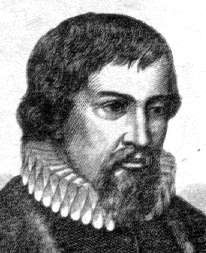Loading AI tools
Czech linguist and writer (1523–1571) From Wikipedia, the free encyclopedia
Jan Blahoslav (20 February 1523 – 24 November 1571) was a Czech humanistic writer, poet, translator, etymologist, hymnographer, grammarian, music theorist and composer. He was a Unity of the Brethren bishop, and translated the New Testament into Czech in 1564. This was incorporated into the Bible of Kralice.

Blahoslav was born in Přerov, Moravia. He studied theory under Listenius and Hermann Finck at University of Wittenberg from 1544. At Wittenberg he became acquainted with Martin Luther, and he was also acquainted with Philipp Melanchthon. After a short period at Mladá Boleslav (1548–9) he continued his education at Königsberg and Basle. He was a linguist who strove to preserve the purity of his native tongue and succeeded in bridging the gulf between Christianity and humanism.[citation needed] He was ordained at Mladá Boleslav in 1553, and became a bishop of the Fraternity of Czech (or Moravian) Brethren in 1557. In the following year he established himself at Ivančice, where before long he installed a printing press. Towards the end of his life he moved to Moravský Krumlov, where he died, aged 48.
Blahoslav was the editor of the 1561 Czech-language hymnal of the Unity, a hymnal which was reprinted and revised at least 10 times over the next 50 years.[1] His Muzika (1558) -- a "theoretical instruction book for the singing of hymns" -- has been called "the first book in Czech presenting the theory of music and singing."[2]
Blahoslav's work influenced Jan Amos Komenský.
Seamless Wikipedia browsing. On steroids.
Every time you click a link to Wikipedia, Wiktionary or Wikiquote in your browser's search results, it will show the modern Wikiwand interface.
Wikiwand extension is a five stars, simple, with minimum permission required to keep your browsing private, safe and transparent.